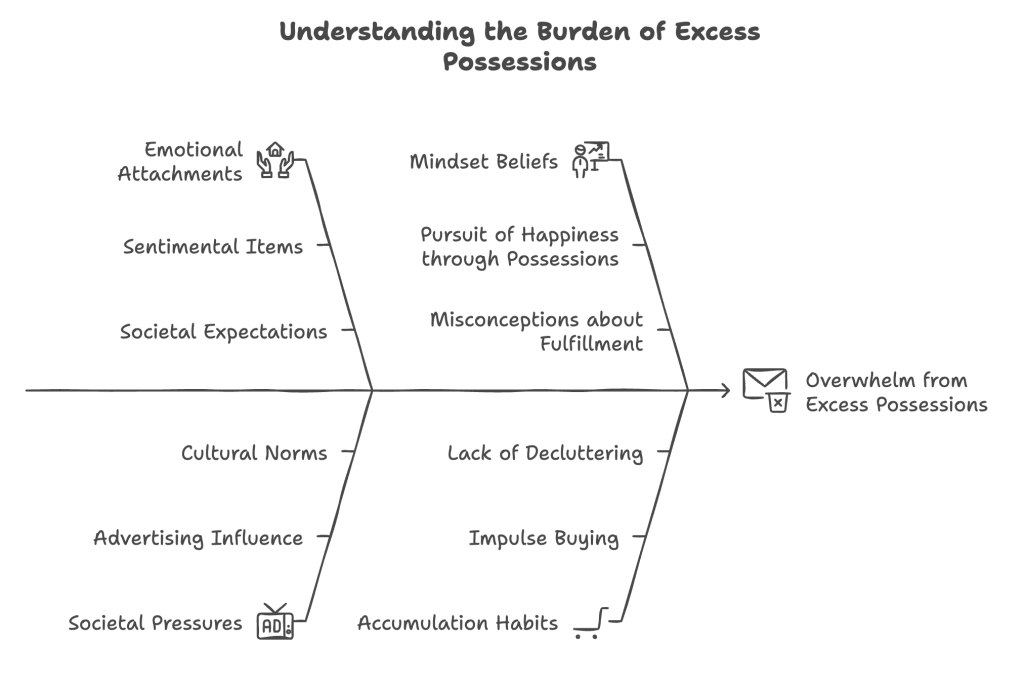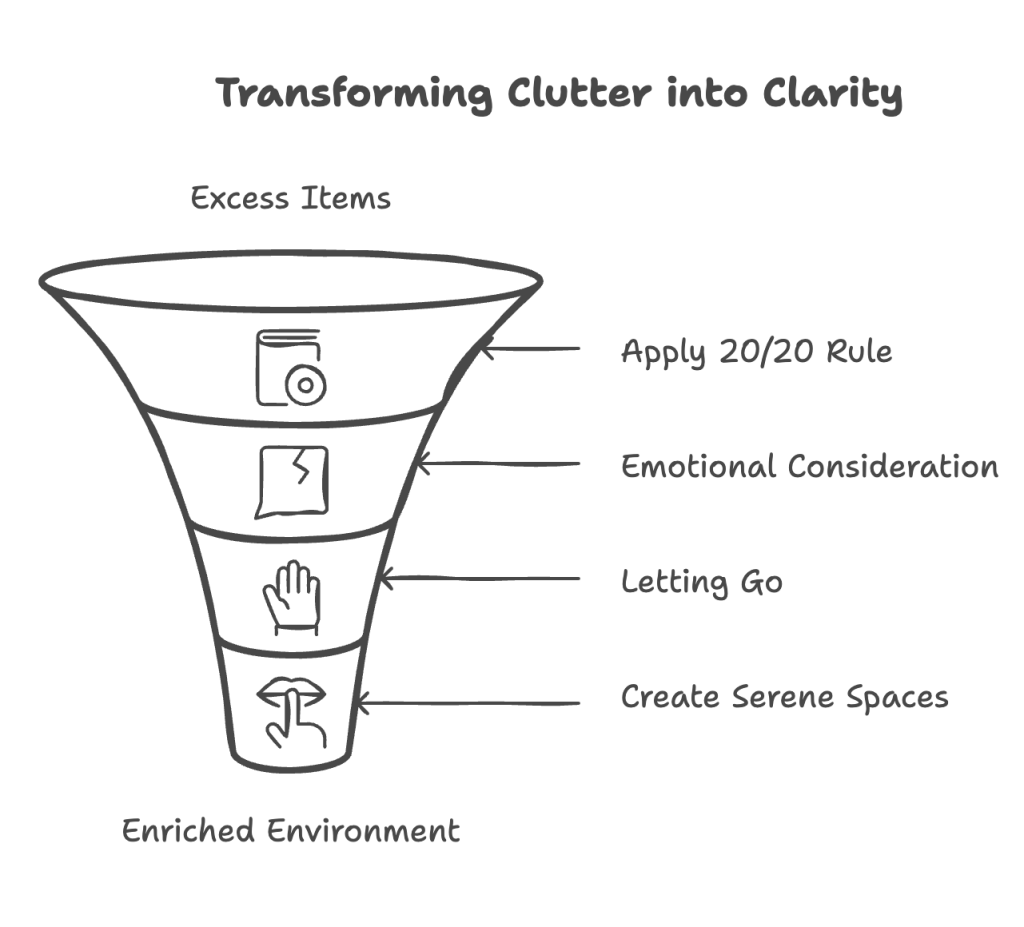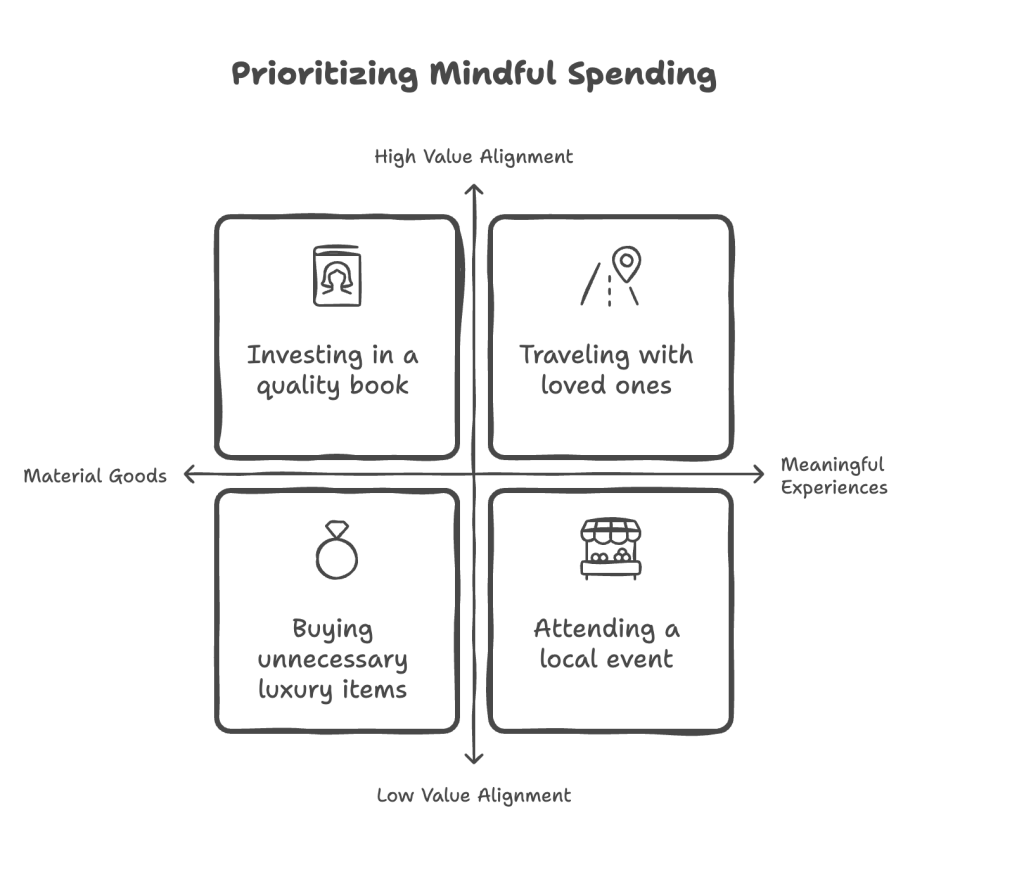Embracing Minimalism: How Letting Go Can Transform Lives
Letting Go Can Transform Your Life
Imagine waking up each day feeling unburdened, filled with peace and clarity. For many, daily life feels overwhelming—weighed down by obligations, possessions, and societal expectations. This burden leads to feelings of suffocation, dissatisfaction, and unshakeable chaos.
Yet a minimalist lifestyle offers hope for those seeking to reduce their material burdens and transform their outlook. The journey of decluttering thoughts, relationships, and belongings can inspire others to embrace simplicity in a world that glorifies excess.
The Need for Change
Do you feel overwhelmed by your possessions? Are you fighting a constant battle with multiplying clutter? Many people’s living spaces overflow with untouched items, carrying an emotional weight that becomes unbearable.
These moments of realization often serve as turning points, revealing that acquiring more doesn’t lead to happiness. We’re bombarded with advertisements claiming the latest gadget or fashion trend holds the key to success and fulfillment. Yet possessions often create more stress and anxiety than joy.
When we keep more than we need, we trap ourselves in cycles of overwhelm. This accumulation clutters both our space and mind, making it difficult to find peace. Each possession carries memories, attachments, and societal expectations. The belief that “more equals better” rarely leads to true fulfillment. Recognizing this truth marks the first step toward meaningful change.

The Toll of Excess
Consider how your environment shapes your feelings and well-being. External chaos often mirrors internal turmoil. Research shows that clutter increases stress levels and decreases productivity. People in cluttered spaces frequently report heightened anxiety and poor concentration.
This overwhelm manifests in various ways: increased stress, scattered focus, and diminished emotional well-being. Every possession demands attention, whether you realize it or not. As you move through your days, each item carries layers of memories and expectations.
Many discover that “more is better” leads nowhere fulfilling. Instead, this mindset creates a sense of bondage, blocking our ability to feel grateful for what truly matters.
Societal Pressures
Life in our consumer-driven world can feel suffocating. The constant push for the newest and best breeds inadequacy and discontent. Social media’s curated images of beautiful homes and lavish lifestyles intensify these feelings.
We measure our lives against others’ highlight reels, feeling like failures when we don’t match up. Yet when people begin letting go of purposeless items, they often experience profound relief. What if simplicity, not excess, became our ultimate goal? As Leonardo da Vinci wisely stated, “Simplicity is the ultimate sophistication.” Embracing simplicity frees us from societal expectations, revealing what we truly value.
Shifting Perspectives
To create meaningful change in your life, consider these steps:
- Identify Overwhelming Moments and Their Triggers: Notice when you feel most overwhelmed. What situations or possessions spark these feelings? Understanding these root causes is essential for change.
- Assess Your Belongings: Evaluate which items serve a purpose and which merely occupy space. Though this process requires difficult decisions, it’s crucial for mental clarity.
- Challenge Societal Norms: Question whether purchases stem from a desire to impress others or genuine needs. This awareness empowers more intentional choices.
By recognizing how excess affects mental health and challenging societal pressures, you can reclaim both physical and mental space. This journey demands self-reflection and facing discomfort, but its rewards prove profound. Embracing minimalism means decluttering not just your space, but your mind.
The Principles of Minimalism
Consider the practical 20/20 rule: let go of items replaceable for under $20 within 20 minutes. This simple guideline reveals how little we truly need and exposes accumulated clutter. Surrounding yourself with only enriching items creates a peaceful, inspiring environment.
Decluttering combines emotional and physical work. Letting go feels daunting, especially when thoughts like “What if I need it someday?” arise. Yet as Joshua Becker, a minimalism advocate, states, “The first step in crafting the life you want is to get rid of everything you don’t.”
Releasing unnecessary items uncovers clarity and creates serene spaces that nurture growth and creativity.

Embracing Simplicity
Minimalism transcends mere decluttering—it embraces simplicity as a lifestyle. Creating space allows what truly matters to emerge. Excess clutter drowns out life’s essential aspects, making it hard to appreciate surrounding beauty and joy.
A tidy space refreshes and calms. This environment transforms your mind into a canvas for creativity and inspiration. For many, minimalism evolves from philosophy to lifestyle, deepening purpose and fulfillment.
Unused books, unopened gadgets, and forgotten items create needless chaos. Yet with each release comes deeper calm and clarity.
Personal Experiences with Minimalism
Picture a closet overflowing with trend-chasing outfits. After donating excess clothes, many discover unexpected joy in simplicity. A streamlined wardrobe simplifies daily choices, transforming routines and freeing mental space.
Eliminating excess creates room for meaningful pursuits in both physical and mental realms. The 20/20 rule reduces decision fatigue, helping you focus on what matters. Releasing clutter increases clarity and joy.
Minimalism illuminates true priorities. Owning less creates space for experiences, relationships, and authentic happiness.
The Emotional Challenges of Letting Go
Why do we cling to items that no longer serve us? Is it fear, sentimentality, or both? Perhaps it’s time to face these fears and welcome personal growth.
Everyone has heart-tugging sentimental items. These possessions carry stories and memories but can hinder progress. Wrestling with emotional attachments is universal. Many of us have kept childhood toys, friendship gifts, and memory-filled textbooks.
The guilt of releasing once-meaningful items can overwhelm. Consider three challenging possessions: a childhood diary, old concert tickets, and your first car. Yet deciding to release these items often brings relief and clarity, creating space for what truly matters now.
Coping with Emotional Attachments
To handle emotional attachments, try these strategies: photograph items to preserve digital memories, keep select meaningful pieces, or share your feelings with a trusted friend. Letting go requires courage and honesty.
Each step toward decluttering leads to a lighter, more fulfilling life. As physical clutter diminishes, you may reassess relationships. Some connections feel burdensome, prompting evaluation of toxic friendships.
Notice signs of toxicity: consistent negativity, undermining behavior, and one-sided support—all crucial for growth.
Reevaluating Relationships
Toxic relationships drain energy and block progress, appearing in various forms—from consistently negative friends to fair-weather acquaintances. Understanding these dynamics helps build a supportive social circle.
Refusing negative influences lifts a tremendous burden. Focusing on positive connections nurtures mental and emotional health. Clearing negativity makes room for genuine, uplifting friendships.
Exploring new social circles rejuvenates life. New activities and groups bring fresh energy to your routine.
Nurturing Positive Connections
Understanding relationship energy dynamics is vital for well-being. Positive connections energize and foster growth, while negative ones stifle progress. After removing toxic relationships, many find renewed life energy, feeling empowered to pursue passions.
Quality trumps quantity in friendship. A few deep connections offer more support and joy than many surface relationships. Reflecting on who truly enriches your life leads to meaningful experiences.
Connecting with like-minded individuals creates belonging and enhances happiness.
The Importance of Investing Time
Invest in people who genuinely enrich your life. Supportive relationships foster growth and joy. Prioritize experiences over possessions. Life’s most enriching moments come from shared experiences, laughter, and connection.
Consider a memorable trip with friends—such experiences become treasured memories, far outweighing any luxury item. Experiences shape our memories and build lasting happiness, especially when shared with loved ones.
The Joy of Experiences
Activities that bring joy enhance life quality. Volunteering and community service enrich your spirit while fostering connections. These connections boost empathy and happiness.
Each hour helping others brings profound fulfillment, proving that giving surpasses receiving in joy.
Practicing Mindful Spending
Align spending with values through mindful choices. Prioritize meaningful experiences over material goods. Many find that travels and shared experiences bring more joy than luxury items.
This insight emphasizes creating memories over accumulating things. Choose activities that reflect your values for a fulfilling life. Whether exploring hobbies, traveling, or spending time with loved ones, these experiences enrich life beyond material possessions.

Finding Balance in Life
As you explore minimalism and personal growth, seek balance. Embracing simplicity doesn’t mean rejecting all possessions. Instead, find harmony between ownership and lifestyle.
Mindful consumption means evaluating genuine needs and desires. Ask yourself: Will this truly enhance my life, or add clutter? This thoughtful approach creates an environment aligned with your values and aspirations.
The Ripple Effect of Minimalism
Minimalism creates ripples throughout life. As you release excess, notice changes in mental clarity and relationships. Decluttering catalyzes personal transformation, encouraging reassessment of possessions, priorities, goals, and values.
Many find that physical decluttering inspires changes in other life areas. These changes might include adopting healthier habits, exploring new interests, or deepening connections. Minimalism often leads to greater purpose and fulfillment.
Embracing the Journey
Minimalism isn’t a destination but a continuous journey. Each day offers chances to simplify and prioritize what matters. Navigate this path gently.
Releasing attachments and changing habits takes time. Celebrate progress and honor each step forward. Stay open to new experiences and perspectives. Explore what simplicity means to you.
What sparks joy? Which activities enrich your life? Trust your desires and values to create your unique lifestyle.






